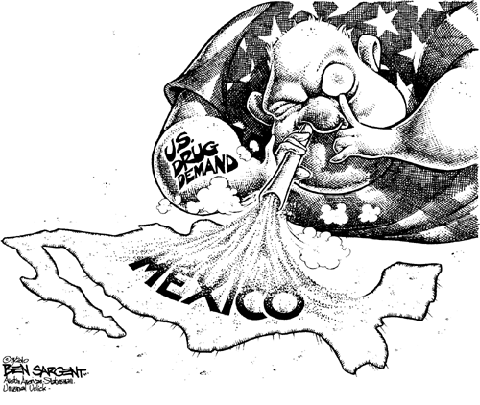
The ISN’s Editorial Plan coverage of increased global interdependence provides an opportunity to take a look at the Mexican drug cartels and their security threat beyond the country’s borders. Only last month, Mexican marines arrested five suspected members of Los Zetas, one of the two most powerful and dangerous cartels that dominate the Mexican drug war. However, enthusiasm about this remains dampened since success in capturing or killing high-ranked drug traffickers hasn’t had any effect on the level of violence in the country.
When President Felipe Calderon took office in 2006, he announced an aggressive military–led strategy against the drug cartels, totally in line with the American declared “war on drugs”. The extensive use of military forces to support the weak police system has however caused a rise in the number of reported human rights violations committed by the army and led to an increasingly violent war, which has resulted in an estimated 45,000 of deaths since 2006.
Many Mexicans have come to believe that Calderon has lost the fight against the cartels. The consequences of this are tremendous for the Mexican society and state. But as we now, transnational organized crime has also broader effects across countries. The United State particularly suffers from the increased power of the drug cartels in Mexico. A weakened Mexican state facilitates not only the flow of drugs, but also of weapons, money and illegal immigrants, which makes it more difficult for the US to control the border.
Just as Mexico serves as an important anchor of the whole region and affects the other countries with its problems, there are many external factors, too that make it difficult for Mexico to handle the drug problem. One should bear in mind that the US is the world’s largest consumer of illicit drugs. As the US military shut down the transit routes leading from Colombia directly to Miami from the 1970’s to the 1990’s, drug trafficking is primarily directed through Mexico. This has served to strengthen the Mexican drug cartels.
However, as Samuel Logan said in an ISN podcast Calderon’s strategy to go directly after the cartels is only one out of many strategies the president could choose from. In a new report the Global Commission on Drug Policy (GCDP) urges the international community to put an end to the “global war on drugs” and to undertake fundamental reforms in their national and international drug policies.The Commission recommends the countries to pursue a harm reduction approach to the drug problem, rather than a law enforcement one. Drug users shouldn’t be criminalized and hence marginalized; instead they should be offered access to health treatment services. The GCDP also encourages governments to experiment with models of legal regulation of drugs in order to undermine the power of organized crime.
In September this year, President Calderon in fact stated that if the US isn’t able to limit its drug consumption, then “decision-makers must seek more solutions — including market alternatives — in order to reduce the astronomical earnings of criminal organizations”. Although Calderon chose his words carefully, it can be interpreted that he recommends the US to consider the legalization of drugs. This constitutes a major shift in the president’s previous policy and a huge step in the direction of a more comprehensive approach to the drug problem.It remains to be seen if Mexico is serious about this change in policy and if the US is willing to deviate from its zero-tolerance approach and establish new forms of regional counter-narcotics cooperation any time soon. Because one thing is for sure, as long as drug demand in the US is fueling the drug trafficking, Mexico stands no chance winning the fight against the cartels.

